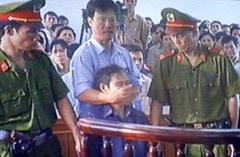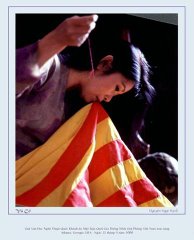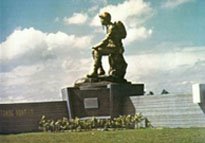
By Rep. Loretta Sanchez (D-Garden Grove)
The media has historically played a major role in strengthening democracies and fostering development around the world. As a human rights advocate, I think the power of the press and fighting to improve human rights go hand-in-hand.
Government propaganda and press censorship aim to create a distorted reality and manipulate thought among a government's citizenry. Although the Vietnamese government would argue that freedom of the press does exist, how do they explain the incarceration of journalists Nguyen Vu Binh and Tran Khai Thanh Thuy?
Although the Vietnamese Constitution says "the citizen shall enjoy freedom of opinion and speech, freedom of the press, the right to be informed, and the right to assemble, form associations and hold demonstrations in accordance with the provisions of the law" the reality is that the flow of information is still subject to the discretion of the government.
The statistics speak for themselves:
Vietnam has no private ownership of its 500-plus newspapers and magazines;
Approximately 2,000 of Vietnam's 5,000 Internet sites are currently blocked for posting content that the state has deemed "subversive" or "reactionary;"
Foreign journalists are subjected to harsh scrutiny when covering stories within Vietnam, and are often expelled if they are believed to be working against the interests of the State;
Radio Free Asia is continually jammed;
And journalists, poets, democracy and human rights advocates and "cyber dissidents" continue to be harassed, placed under house arrest, and issued harsh jail sentences.
And you see it in the headlines. Following my trip to Vietnam last April, the headlines in the U.S. and Europe read: Vietnam police bar dissidents' wives meeting US ambassador (AP, 4/6/2007); O.C. lawmaker: Hanoi 'goons' accosted group (Orange County Register, 4/6/2007). Whereas the Vietnamese government-controlled media headlines read: Terrorist group works out plan for Sanchez's visit (Vietnam Net Bridge, 4/8/2007).
Conversely, headlines in my district (the 47th Congressional District) that has one of the largest Vietnamese constituencies outside of Vietnam, include stories of oppression, religious and political persecution- painting a better picture of what is happening in Vietnam. They have been a vehicle for informing Americans on the injustices occurring in Vietnam.
World Press Freedom Day (observed on May 3) celebrates press freedom and recognizes the on-going plight for journalists to freely report the news. Journalists in Vietnam struggle with censorship and persecution everyday. Despite numerous publications and media outlets operating in Vietnam, information is highly censored and tracked. Journalists risk police retribution in speaking out against the government.
As a member of the Congressional Human Rights Caucus & Co-founder of the Congressional Caucus on Vietnam, I've participated in panel discussions on the silencing of media in Vietnam and repeated violations and persecution of freedom of expression and information in Vietnam.
This year, I led an international effort in calling for the immediate release of incarcerated journalist Nguyen Vu Binh, former journalist for Tap Chi Cong San (the Journal of Communism). Binh was incarcerated shortly after publicizing articles over the Internet calling for multi-party democracy. According to his wife, he has been food poisoned several times in prison and needs immediate medical attention. Although the congressional request gained the support of Secretary of State Condoleezza Rice, the Vietnamese government has not released him.
Another press suppression incident includes the recent arrest of Tran Khai Thanh Thuy, an award-winning journalist and writer. Thuy was reportedly taken into custody Saturday, April 21, at her residence, where she was held under house arrest. According to the Committee to Protect Journalists (CPJ) Thuy was charged with violating Article 88 of Vietnam's criminal code, which prohibits the dissemination of information that authorities deem harmful to the state.
Just this year, Reporters Without Borders, reported the imprisonment of seven Vietnamese journalists for violating criminal code for their writings or online postings. Reporters Without Borders says that "Vietnam remains one of the world's most repressive countries where the Internet is concerned." They say, "the [Vietnamese] government blocks access to websites it considers politically and morally 'dangerous,' including foreign news sites and those of human rights organizations set up by Vietnamese abroad."
Despite their limitations, journalists in Vietnam continue to risk their lives reporting factual information that often challenges and questions government policy. Although the Vietnamese government interrupts and monitors their channels of communication by fire walling internet lines, jamming cell phones, shutting down media outlets and arresting journalists they continue to write.
I will continue to work with my colleagues in the U.S. Congress to promote awareness and policy debate on Vietnam's repressive human rights policy how it affects our country's relationship with Vietnam.
Freedom of expression is a fundamental human right, and is an essential tool in weighing the transparency and openness of society. And the Vietnamese government has a long way to go if it hopes to one day become a fully integrated member of the global community.






No comments:
Post a Comment